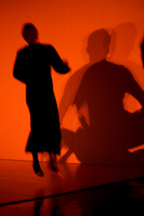

performance
Lublin Dance Theatre
Lublin, Poland
Lublin Dance Theatre & kilku.com
Direction and dance: Wojtek Kaproń
Visual design: Aleksander Janas, Robert Zajac
Music: Konrad Chyl
Production: Teatr Centralny – CK in Lublin
The show lasts 40 minutes.
“Point as a form of non-existence, cosmos, soundless simple form, subordinated to the internal tension and on the external impulses, creates the structure of a line, which appropriately impregnated, may generate various types of emotions”.
The spectacle was inspired by the painting of Wassily Kandinsky as well as by his theoretical works, especially by the publication: “Point and Line to Plane”.
--
Lublin Dance Theatre was established in 2001 by Hanna Strzemiecka, the Theatre's first choreographer and artistic director, and Anna Żak, Ryszard Kalinowski and Wojciech Kaproń, members of the Contemporary Dance Group of Lublin University of Technology. This Group has been one of the first, independent contemporary dance theatres in Poland, and after several years from the start of its operation the Group developed its own original style and started to be recognised in Poland and abroad. Thanks to the consistent implementation of their artistic mission a professional dance theatre was established at the Culture Centre in Lublin.
The artistic shape of particular performances is being worked out in the process of individual exploration of each of the theatre's members, who build their own, specific dramaturgy and aesthetics. In this way the Theatre's repertory is going to consist of works different in style, technique and philosophy.
Lublin Dance Theatre has been undertaking numerous artistic and educational initiatives aiming at promotion of the contemporary dance art, as a means of expression full of intellectual and emotional potency. Special attention is being paid to the cooperation with cultural institutions in Poland and abroad focusing on creating a net of centres promoting contemporary dance through stage presentations, workshops, lectures, exhibitions, video projections, as well as dance events organised in “non-theatrical” places.
Lublin Dance Theatre has been a participant of numerous festivals and presentations in Poland, e.g. Bytom, Kraków, Warszawa, Gdansk, Poznan, Lodz and worldwide - USA, Switzerland, France, Hungary, Germany, Spain, Russia, Lithuania, Belarus, the Netherlands, Finland, Tunis, Austria, Ukraine.
Lublin Dance Theatre, both individually or in cooperation with the Contemporary Dance Group of Lublin University of Technology, initiates and organises cultural and educational projects, such as the annual International Lublin Dance Theatres Festival - since 1997, Contemporary Dance Forum - since 2003, Chagall Festival in Lublin - 2003, Polish Contemporary Dance Festival in Helsinki - 2004.
The starting point of LDT’s “cosmos” were the theoretical works of Wassily Kandinsky, one of the founders of the 20th century fine art’s avant-garde. His attempts of expressing in language the problems, with which the abstractionist painter struggled, inspirited Kaproń to create and dance the chorography, which transforms the two-dimensional world of point and lines into three-dimensional scenic model. The dancer’s movements in the cubical space, illuminated by the colorful projections, immersed in the music, activate the game of forms, asymmetrical and abstractive, deprived of plot the “object to be watched”, the work – synthesis of arts. There is a certain reliability of search for the individual ways of expression in this intention, typical for the avant-garde. …
“The Utopia’s rings of Wojciech Kaproń”, Grzegorz Kondrasiuk, Gazeta Wyborcza
Chorographical debut of Wojcech Kaproń surprises with its character. Wojciech Kaproń, deriving his inspiration to his work from the thought of the top Russian abstractionist, decided to an absolute abstractive spectacle. Free of characters’ creation, fathoming out the “interpersonal relations”, focused on form exclusively. On the stage, he tries to dehumanize himself: “isolate from the possible psychological or narrative interpretations”…
Kulturaenter, Witold Mrozek
